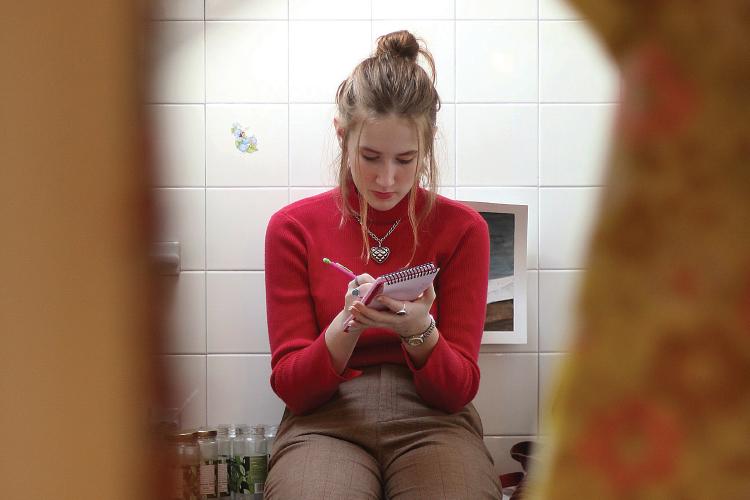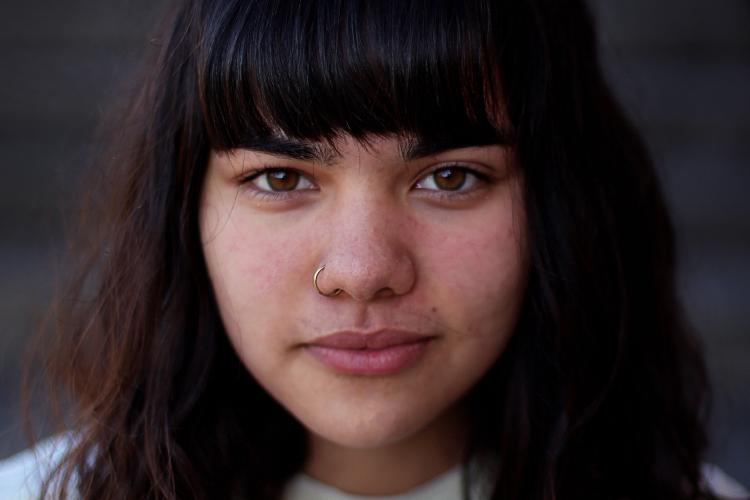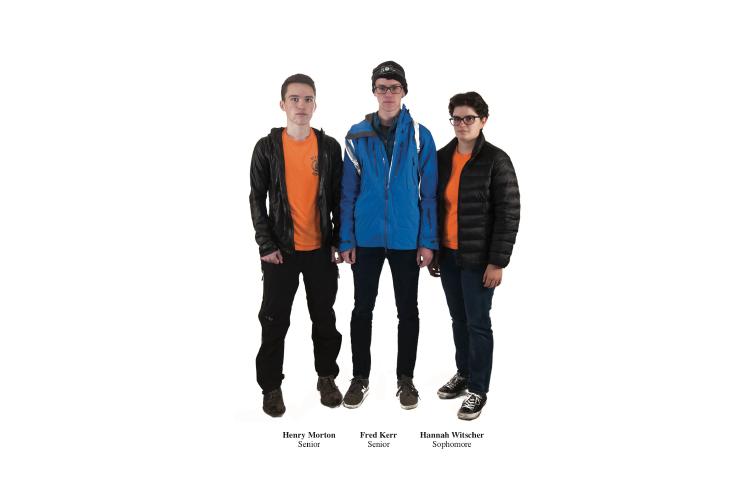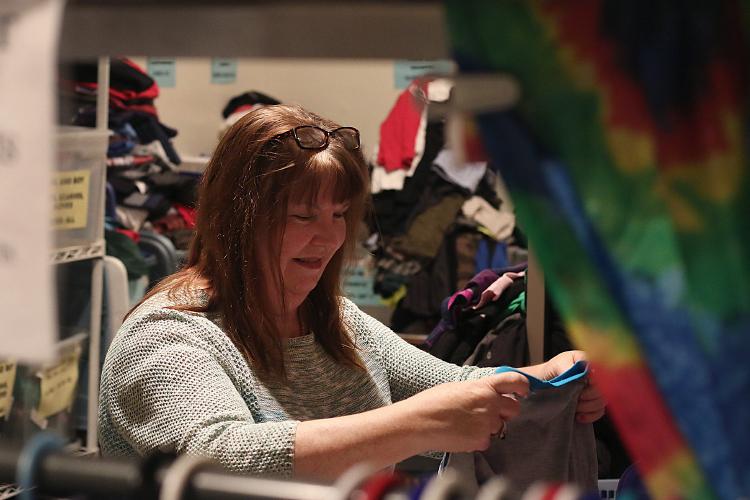
On a spring afternoon, then 14-year-old Emma Cooper breathes frantically as she sits on her front steps and waits for the ambulance to arrive. Draped in a blanket and comforted by her trusted neighbors, Cooper replays the image of herself swallowing allergy medication and pain relievers.
Cooper felt as if she was merely a burden, as if her own struggles with mental health were putting stress on her family. She feared that others were aware of the mask she used to cover her depression and anxiety.
Cooper has survived living with mental illness since she was in middle school and has met with numerous social workers and counselors — many of whom were not understanding of her experiences and challenges.
However, Cooper found an outlet in creating safe spaces for others, working with multiple social justice-based organizations to generate positive societal change within her community.
She now finds empowerment through her activism. Her experiences with depression and anxiety drive her to become a mentor for others who may be experiencing mental illness as well. By advocating for others and embracing feminism, Cooper has found her voice.
“(Empowerment) helped me with confidence because if I was advocating for feminism then I was advocating for myself,” says Cooper.
. . .
Cooper was born June 27, 2001, to Kristin and Phillip Cooper.
Cooper has always enjoyed helping others. At a young age, she participated in Spark Camp – which provided opportunities for children to volunteer in their community – and camps led by the Oregon Humane Society.
One summer day in 2012, when Spark Camp opened their doors to serve food to the homeless, Cooper sat next to a man who was indulging in a fresh meal.
As the casual small talk progressed, Cooper ended up learning his life story. “It was eye-opening because he was talking about how much help (Spark Camp) had given him,” says Cooper. “I think that was big to see how (the volunteer work) was actually affecting people’s lives.”
While she continued volunteering for multiple nonprofits in middle school, depression caused by trauma began to consume her life. Cooper decided to spend more time with friends, rather than acknowledging her anxiety and depression.
After years of suppressing her emotions, she couldn’t ignore them anymore.
“It was less morbid but more hopeless,” says Cooper. “It wasn’t that I wanted to die, I just didn’t want to deal with (mental illness) and I didn’t know any other way to stop it.”
On March 1, 2016, Cooper attempted suicide.
She woke up in a hospital bed at 1 a.m., confused and weak, attached to monitors and machines. “I was really, really tired and sick, and I was just wondering what happened,” she says.
The second week of her hospital stay, Cooper was diagnosed with Obsessive Compulsive Disorder (OCD), Post Traumatic Stress Disorder (PTSD), anxiety and severe depression.
“(OCD) is the worst to control because I feel like there’s so much about how to control depression: you can take all these meds,” says Cooper. “But (with OCD) if something feels off, I cannot stop thinking about it.”
Cooper’s OCD was provoked by anxiety, meaning that her perceptions of miscellaneous details amplified when she felt stressed. Small things, like an article of clothing that felt out of place, often prevented Cooper from focusing on her school work until she felt comfortable.
Because Cooper struggled to express her feelings of anxiety and depression, the hospital decided to set Cooper up with professional help for her to open up.
Each therapist Cooper met with had their own assumptions of her well-being without understanding her struggles. “It’s so much harder to understand (mental illness) if you haven’t experienced it,” says Cooper.
“As a person who’s gone through (mental illness) I feel responsible to speak up about it” – Emma Cooper
The hospital appointed her a new therapist and psychiatrist. When the psychiatrist grew frustrated with Cooper for not opening up, she sent Cooper to the Emergency Room twice, claiming that she was “unsafe.”
The second time, Cooper refused to move from her seat; her psychiatrist called an ambulance. In a matter of minutes, paramedics and police officers were ready to take Cooper away for another Emergency Room visit.
Once at the hospital, Cooper refused to go back and speak with either her new therapist or psychiatrist. This was only the beginning of the long and winding road of social workers.
She began to work with various therapists, programs and organizations, searching for someone with whom she felt comfortable confiding in.
On July 6, 2016, after finding her previous services unhelpful, it was decided that Cooper would go to a residential treatment center.
Every resident within the center, 9 to 15-years-old, was battling substance abuse or mental illness in different ways, or was in foster care. All staff members were therapists who could offer support and teach coping skills.
But Cooper soon noticed the fights that broke out at least once a day in the center. It was an environment where she couldn’t have an unmonitored conversation. “I just felt really isolated,” she says. “It was the lowest but also most meaningful time of my life.”
On August 26, three days before her sophomore year began, Cooper left the residential treatment center and returned home. “I learned that everything is really what you make of it, and there’s something to get out of everything, and I think that helped me make sense of my struggles,” says Cooper.

Coming back to high school, Cooper continued her involvement within her community.
Though she always knew she loved helping others, it wasn’t until a school-wide debate about rape culture that Cooper decided it was necessary for her to advocate for women’s rights.
In May 2017, Grant history teacher David Lickey wrote a letter denying the existence of rape culture that caught national attention. Before the letter hit the news, Cooper had a copy.
Tension building up in her body, Cooper read the letter. Shocked and angry, she remembered all of the derogatory names she had been called and the controlling relationships she had endured in her past.
Cooper burst into her English class, where Courtney Palmer — her English teacher at the time — was awaiting her arrival. Cooper handed Palmer the letter after having texted her about it, and Palmer read it to the class.
“Some issue comes up that’s emotionally or physically traumatizing to students or to faculty and we’re just not gonna talk about it … I don’t want that to be the environment that I teach in,” says Palmer. “I don’t want (rape culture) to be something we don’t talk about.”
Palmer began a class discussion about everyone’s initial reactions to the letter, making sure to include her personal response as well. “I think modeling discomfort is very important,” says Palmer.
Initially, Cooper was opposed to listening to those who defended the letter.
However, as time progressed, she realized that listening to others and forming thought-out responses led to more productive conversation.
“Once I realized that people don’t know (rape culture) is a problem, I felt more of a need to talk about it and to help educate people about it so there won’t be issues like this in the future,” says Cooper.
Resources, such as support from Volunteers of America – a large-scale nonprofit organization – were provided to help students and faculty cope with the trauma from the letter. The advocates from Volunteers of America are not mandatory reporters, and therefore served as a safe space for students to share their stories without the stress of censoring themselves.
“Struggling with mental health is unique for everyone, but it’s also very prevalent and it affects a lot of people,” says Cooper. “I think rape culture would impact my mental health, and my mental health would impact my side of rape culture, like my confidence and what I thought I deserved.”
After Jessica Murray, Grant’s Activities Director, introduced Cooper to the teen advocates, Volunteers of America became Cooper’s primary source of support while dealing with her mental illnesses.
Cooper later connected with Raphael House, an agency dedicated to helping survivors of domestic violence. Both Volunteers of America and Raphael House worked closely together, which led Cooper to find volunteer work at Raphael House as a peer educator.
Cooper began to organize activities involving educating her peers about rape culture.
At Grant’s 2017 Homecoming Carnival, Cooper and Jessica Rodriguez, a teen advocate from Volunteers of America, stood behind a fold-out table and gave candy to those who could correctly answer questions about the culture of consent. It’s events like these that fuel Cooper’s dedication towards education-based activism.

Cooper now works with a variety of education-based organizations, such as Raphael House, Grant’s leadership program and Beyond Differences — an organization that works to end social isolation in middle schools.
“She’s gained a lot of confidence and gained a lot of energy, and (has found) somewhere to direct what’s coming from her heart,” says Kristin Cooper, Cooper’s mother.
On a recent Friday, Cooper passes offices and multi-colored playrooms on her way to the Raphael House conference room. Volunteers line the table and attentively absorb the new information during the advocacy training, nodding their heads in agreement with the lesson.
Advocacy training occurs two to three times a year to teach confidential advocates how to help victims of domestic violence. After the training, Cooper conducts a conversation on the prevalence of rape culture, her white notepad filled edge to edge with scribbled notes and talking points.
As a peer educator, Cooper directs projects that aim to teach students about the culture of consent. She’s active within Grant’s Women’s Empowerment Club, where she strives to continue educating about rape culture.
“It’s been a really long journey, and I’m not all the way there yet, but knowing that standing up for myself is also standing up for my gender and standing up for women as something I believe in, was a really big part of (my journey),” says Cooper.
Cooper also demonstrates her passion for change in the Grant Leadership program.
“In Leadership, she’s really jumped in and she really dives into conversations,” says Murray. “She really asks a lot of questions … (She) has a lot of strong ideas and she definitely will share them.”
Cooper has grown from being reluctant about sharing her opinions, to confidently vocalizing clear plans of action for changes she aims to make within her community.
Cooper intends to continue her service work, her personal experiences with rape culture and mental illness constantly driving her.
As she continues her journey, Cooper is working toward building her confidence and depending more on her approval of herself rather than approval from others.
“As a person who’s gone through (mental illness) I feel responsible to speak up about it, because if I had had a person to guide me or give me advice through it, I think (my experience) would have gone a lot more smoothly,” says Cooper. “If I can be that person in someone else’s life and help them through things, that’s something I’m going to do.”





































